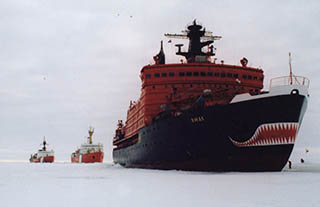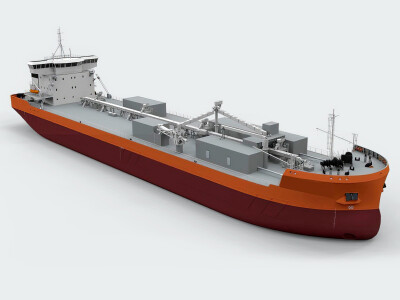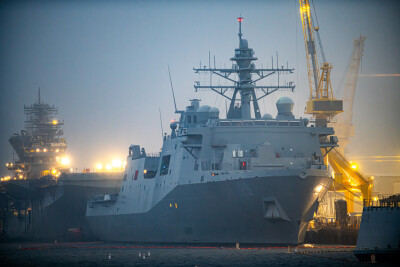Members of Congress heard again Tuesday about the Coast Guard’s need for new heavy icebreakers, and the political and practical realities of cooperating with other Arctic nations.
That includes Russia, notwithstanding problems that the U.S. and Western allies have with Russia’s aggressive foreign policy and military waves in warmer latitudes.
“The Russian Federation is an important partner with responsibility for vast regions of the Arctic and shares a maritime border with the United States,” Vice Adm. Charles Michel, vice commandant of the Coast Guard, told a joint subcommittee of the House Committee on Foreign Affairs. “It is in the interests of U.S. national security for the U.S. Coast Guard to maintain open lines of communication with its Russian counterparts to ensure effective cross-border search and rescue operations, maritime law enforcement, and pollution response.”
One subcommittee chair, Rep. Dana Rohrabacher, R-Calif., set that tone at the opening of the Nov. 17 hearing on Navy and Coast Guard planning for a warming Arctic.
“The Arctic is not immune to the same forces of geopolitics,” Rohrabacher said. But he warned against going back to a Cold War view that could bring “hostility and belligerence” to U.S. - Russia Arctic relations.
Rohrabacher also echoed a consensus that has been slowly emerging on Capitol Hill this year: the Arctic is indeed warming, and with it the opening of sea lanes opening for trade, minerals and energy, fishing and tourism.
Arctic warming is “now more accelerated than it has been for decades,” Rohrabacher said. “The purpose of this hearing is not to debate science.” The State Department’s Arctic envoy, retired Coast Guard Adm. Robert J. Papp Jr., said Russia’s actions in Crimea and Ukraine have brought sanctions from the West that may hinder its ability to develop Arctic resources like oil.
“Fortunately, we have worked with Russia on Arctic issues during past political crises and are maintaining activities related to protecting the Arctic environment, ensuring maritime safety, including search and rescue, and law enforcement,” Papp said. “We also continue to work with Russia in multilateral fora, including under the auspices of the Arctic Council, and our allies are following similar policies. We cannot and will not ignore Russian aggression, even as our Arctic cooperation continues.”
Papp and Michel said the United States Coast Guard has already developed a stronger relationship with Russia’s Border Guard on coordinated fisheries law enforcement operations and search and rescue work in the Bering Sea and North Pacific.
That goes for China too, which has observer status at the international Arctic Council, but is in sometimes heated argument with the U.S. and Southeast Asian nations over China’s claims to the Spratley Islands. Rep. Jeff Duncan, R-S.C. asked if the dispute could play into China’s Arctic ambitions. But for the time being, what goes on in the South China Sea, stays in the South China Sea.
“It’s isolated” to that issue, Papp replied. “At the point we are not considering revoking their status as an observer.”
Papp likewise spoke to tamping down what he called “hyperbole” about competition for natural resources and territorial claims. There is a lot of attention on Russia’s bid to extend their continental shelf claims northward, beyond the 200-mile limit accepted as a general standard since the 1970s. Papp said the international rule on the “extended continental shelf” (ECS) is “proceeding in an orderly manner” under the Law of the Sea Convention among the Arctic nations. That process includes collecting data on depth, shape, and geophysical characteristics of the seabed and sub-sea floor, so nations can make a reasoned claim they have interests farther off the beach.
All five nations – Russia, Canada, Norway, Denmark (which owns Greenland), and the United States – have an ECS claim. The U.S. mapped out its claim with nine cruises over 12 years, including four missions jointly with Canada. Since last year a project office between the State Department and National Oceanic and Atmospheric Administration has been working to complete that documentation, Papp said.
Meanwhile, the U.S. Navy is doing its research in the Arctic with remotely operated vehicles (ROVs), sea probes that are likely the only way that future exploitation of Arctic sea floor mineral and energy resources can happen under seasonal surface ice conditions.
“There are challenges operating in that environment,” said Rear Adm. Timothy C. Gallaudet, the Navy commander of meteorology and oceanography. “The Arctic is an environment perfectly suited for those dull, dirty and dangerous kinds of technology.”





